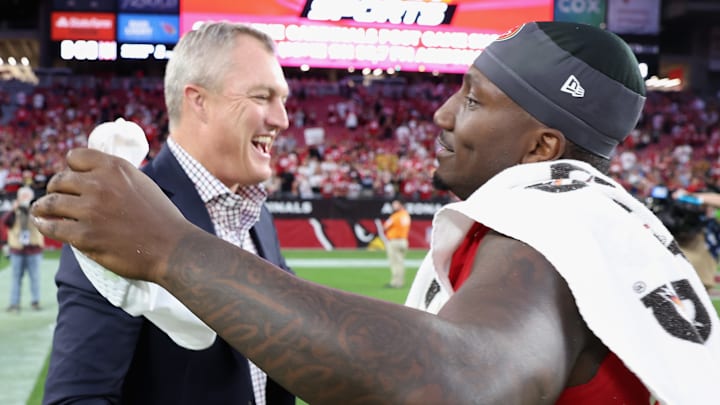Simply trading away Deebo Samuel isn't as easy a proposition as it might seem on the surface.
San Francisco 49ers offseasons are rarely without drama, and wide receiver Deebo Samuel ensured the 2025 offseason is yet another example of this.
The 2021 first-team All-Pro requested a trade, likely citing a diminished role last season along with the realization he wasn't in the Niners' long-term plans once his current contract expires in 2026. And it appears as if San Francisco is willing to move on, too.
That said, a trade isn't exactly something immediately on the table despite the wide receiver's request.
The 29 year old is coming off a down year in which he had career-lows in receiving yards per game (44.7) and yards per rush (3.2), suggesting he's potentially on the decline. As a result, the 49ers would be hard pressed to land a substantial return via a trade.
It'd be one thing if Samuel's contract afforded the Niners an easy "out" here. But it doesn't.
49ers would be hit with a lot of dead money in a Deebo Samuel trade
Currently, according to Over the Cap, San Francisco boasts $48.3 million in salary cap space for 2025, eighth most in the league. General manager John Lynch is likely budgeting approximately $10 million of that to sign his team's NFL Draft picks later this spring, while another $5 million will probably be reserved for in-season roster moves and additions.
That leaves roughly $33 million left, much of which could be ticketed for offseason free-agent targets and/or saved for quarterback Brock Purdy's contract extension, which would go into effect in 2026.
Prior to the start of the 2024 season, the 49ers had a relatively easy out entering 2025 with regard to Samuel, but the decision to restructure his deal by tacking on more void years made a would-be trade significantly more difficult.
Now, per OTC, a trade would incur $31.55 million in dead money. That negative cap hit effectively erases the $33 million surplus, at least in terms of player spend. Arguably the only way Lynch and Co. would be OK with that is if the return on a Samuel trade would be substantial enough to absorb that massive cap hit, such as a first- or a couple of second-round picks.
Again, not likely.
Releasing Deebo Samuel makes more sense than trading him
The Niners aren't fully handcuffed to Samuel, though.
San Francisco has the option to release the veteran receiver with a post-June 1 designation, a rule that allows teams to get out from under expensive contracts by minimizing the cap ramifications. Players can be released at the start of the league new year, thereby being free to sign elsewhere immediately. And while the releasing team won't receive the financial benefits of doing so until June 1, it's often a better strategy than incurring such a massive cap hit with a pre-June 1 release.
Should the 49ers go this route with Samuel, not unlike what they did with defensive tackle Arik Armstead in the 2024 offseason, they'd incur a dead-money hit of $10.57 million in 2025 and 2026 but would save $5.12 million this year and $22.39 million in 2026.
That's much more plausible, namely from a cap perspective. It would tack on $5-plus million to the existing $48 million in space, equaling roughly $53 million once June 1 rolls around.
Related story: Deebo Samuel would love to be traded to one of these 3 teams
Now, a trade after June 1 could still net the Niners the same benefit as a release with that date's designation. But the problem there is blockbuster trades rarely take place at that point of the season, and San Francisco wouldn't be getting much (if anything) in return that'd help with its 2025 campaign, perhaps 2026 draft picks.
Plus, having a disgruntled Samuel around for offseason workouts wouldn't exactly send the right message to the rest of the locker room.
So, if the 49ers are thinking about dollars (they should be), the preferred method might simply be to release Samuel with that post-June 1 designation.
Not trade him.
